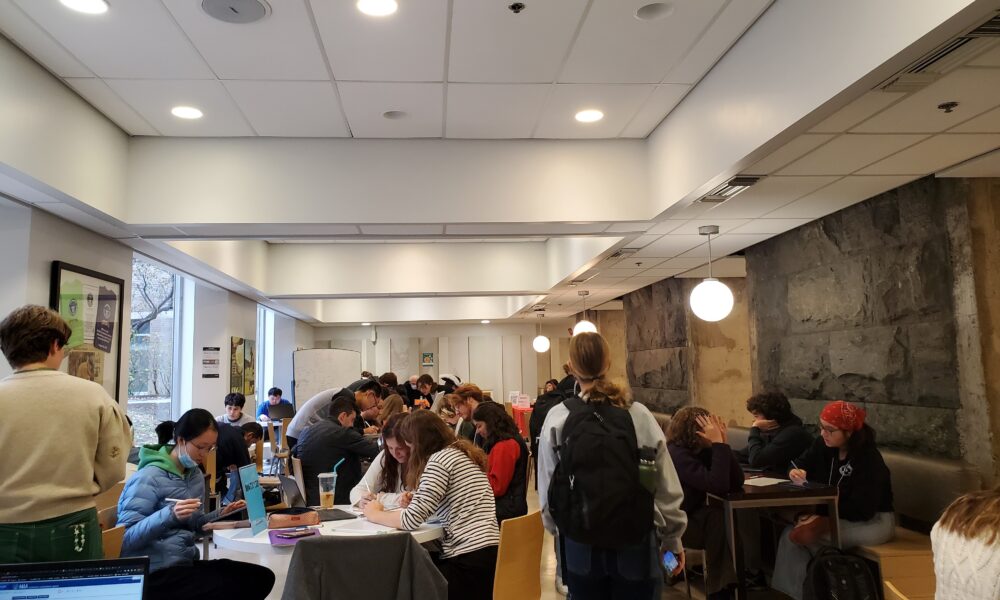On a Monday afternoon during midterm season, the cafeteria of Royal Victoria College (RVC) is the place to be. It’s buzzing with energy, full of people eagerly discussing a wide variety of topics—and no, they’re not there for the food. The students are there for the SciLearn Peer Collaboration, a program offered by the Office of Science Education (OSE) to help students ace their courses by working together.
It’s no secret that intro-level science classes can be isolating: Not only is the material difficult, but in a large class, it’s easy to feel like just another face in the crowd. When you’re looking to get help for an exam or an assignment, it may seem like there’s no one to turn to. SciLearn Peer Collaboration was born from the desire of both students and instructors to have a space outside of lectures to collaborate and connect in order to combat the sense of isolation a student might feel. SciLearn offers a wide range of programs, including workshops and collaborative study sessions for topics like chemistry, math, and physics throughout the academic year.
“The main objective [of SciLearn Peer Collaboration] is to provide an environment between classmates for learning and a mentorship environment for students,” Ezelbahar Metin, the student engagement administrator for the OSE, said in an interview with The McGill Tribune.
In Fall 2022, SciLearn merged with FRezCa (First-year Residence Cafeteria), a program designed to create a supportive environment for students in large first-year science classes, to form the current SciLearn Peer Collaboration program.
“SciLearn focused on giving [students] strategies for learning, FRezCa focused on putting them into action, so the merger made sense,” said Kira Smith, student engagement officer at the OSE, in an interview with the Tribune.
Metin began working for FRezCa as a data collector during her second year of her bachelor’s degree. She stayed on while the program went online and through the merger with SciLearn.
“It’s been fun seeing the changes and different forms FRezCa has taken,” Metin said. “I got involved and never left.”
Students looking to ask questions or work with classmates can find help for a number of the most challenging courses, such as BIOL 200, CHEM 110, and MATH 133. When the Tribune visited SciLearn, the CHEM 110 table was packed with students preparing for an upcoming midterm. Professors from participating courses attend sessions and will either have a designated TA attend or have their TAs conduct some of their office hours at the collaborative study sessions. Also present at SciLearn gatherings are student mentors—upper-year student staff who have taken the courses associated with SciLearn and lend their expertise to current students.
Marie Walker first participated in SciLearn as a student in a workshop. Even though the first workshops she attended were online, Walker was able to form connections with her classmates and has since become a student mentor.
“Now that it’s in person, it’s a really great way to meet your classmates, especially in science, where there might be 300 to 400 people in a class,” Walker said.
SciLearn Peer Collaboration currently operates out of RVC Monday to Friday from 3:00 p.m. to 5:00 p.m. The program has expanded its list of participating courses lately, as well: PSYC 100 is one of its recent additions. For many undergraduate students, SciLearn Peer Collaboration sessions have become a staple resource for their studies. Whether it’s chemistry, physics, math, or psychology, sometimes the best way to learn is together.
For more information, visit the SciLearn website at https://www.mcgill.ca/ose/initiatives/scilearn.
A previous version of this article incorrectly stated that Ezelbahar Metin and Kira Smith were employed by SciLearn. In fact, they are employed by the Office of Science Education. Moreover, the Tribune misquoted Metin. SciLearn Peer Collaboration is primarily a learning environment, not a social one. Finally, the article omitted the fact that professors accompany their TAs to SciLearn sessions. The Tribune regrets these errors.








